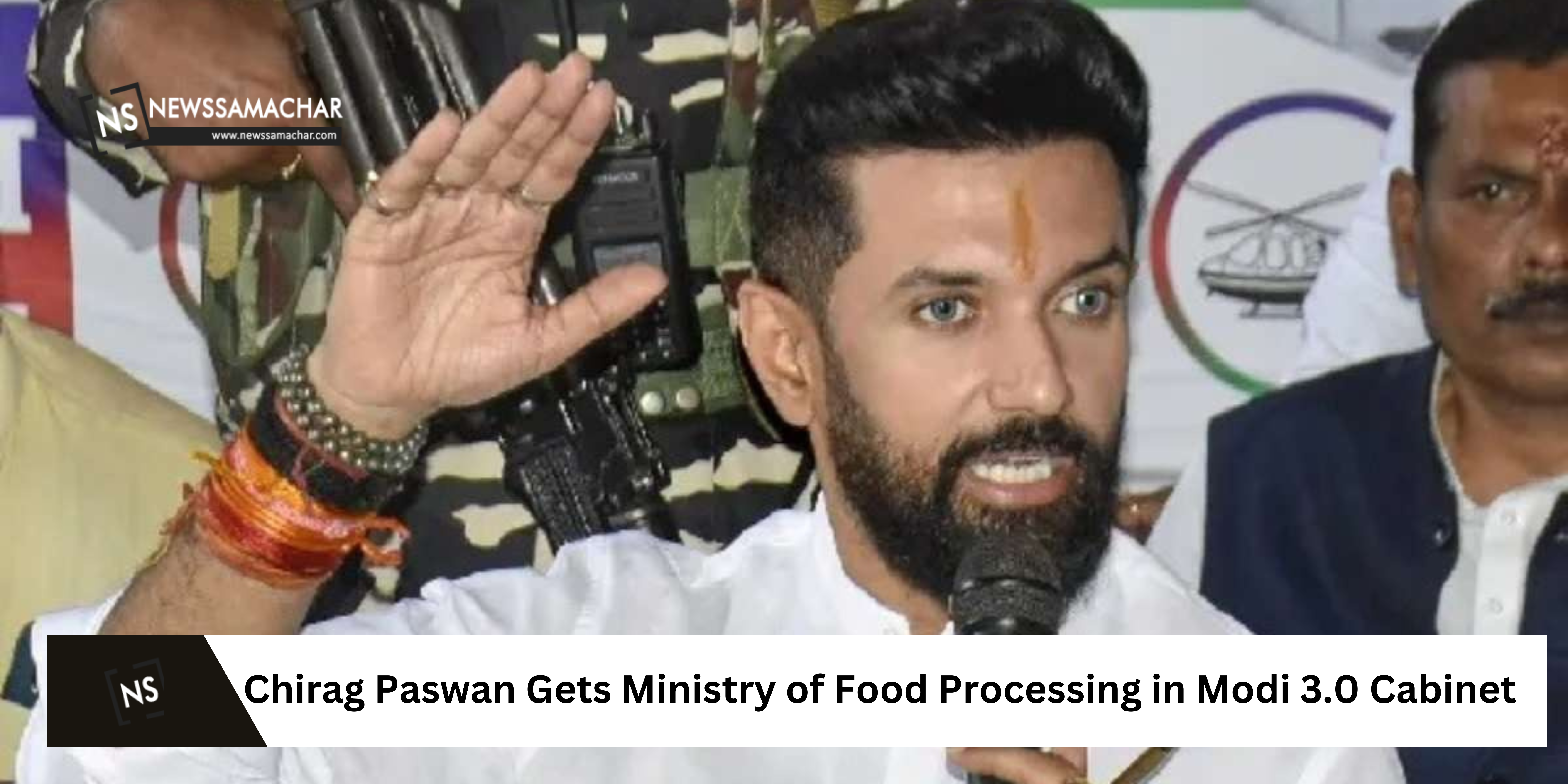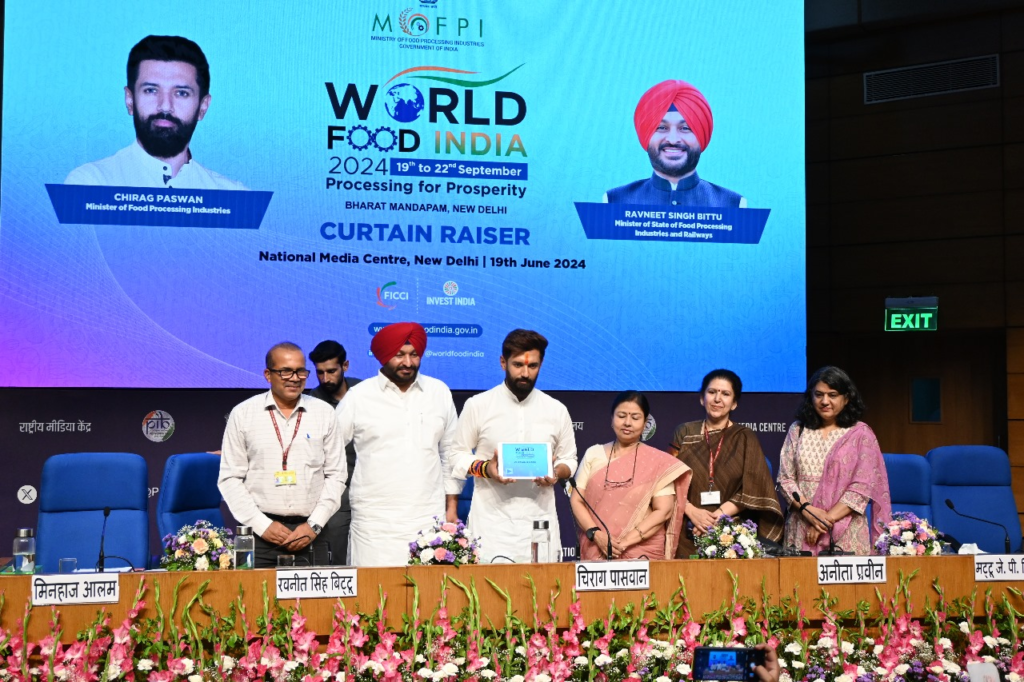
In a significant reshuffle marking the commencement of Modi’s third term, Chirag Paswan has been appointed as the Minister of Food Processing. This move not only underscores the Bharatiya Janata Party (BJP)’s commitment to promoting young leadership but also reflects the strategic importance of the Ministry of Food Processing in India’s economic landscape. This article delves into the implications of this appointment and its potential impact on the food processing sector, instilling confidence in stakeholders about Chirag Paswan’s leadership and his commitment to the industry’s growth.
Chirag Paswan: Carrying Forward a Legacy
The Paswan Legacy
Chirag Paswan, the son of the late Ram Vilas Paswan, a prominent Dalit leader and founder of the Lok Janshakti Party (LJP), steps into his father’s shoes with this ministerial role. Ram Vilas Paswan was a towering figure in Indian politics, known for his contributions to the socio-economic upliftment of the Dalit community and his role in various ministries. Chirag Paswan’s entry into the Ministry of Food Processing continues his father’s legacy, bringing a blend of youthful energy and experienced political understanding, ensuring a reliable and trusted vision for the Ministry.
Ram Vilas Paswan was celebrated for his adeptness in navigating complex political landscapes and unwavering commitment to social justice. His tenure in various ministerial roles, including as the Minister of Consumer Affairs, Food, and Public Distribution, impacted India’s policy framework. By stepping into the Ministry of Food Processing, Chirag Paswan is honoring his father’s legacy and positioning himself as a key player in India’s political and economic arenas.
Rise of Chirag Paswan in Politics
Chirag Paswan’s political journey began in 2014 when he was elected as a Member of Parliament from the Jamui constituency in Bihar. His leadership skills and political strategies soon earned him a significant position within the LJP Ram Vilas. Despite facing challenges and internal party conflicts, Chirag has emerged as a resilient leader, a quality that will undoubtedly serve him well in his new role as the Minister of Food Processing.
From navigating electoral politics to addressing the aspirations of his constituents, Chirag Paswan has demonstrated a keen understanding of Bihar’s socio-political dynamics. His youth engagement, infrastructure development, and education efforts have been particularly noteworthy. As he takes on the Ministry of Food Processing mantle, these experiences are expected to guide his policy-making and administrative decisions.
The Ministry of Food Processing: A Strategic Portfolio
Importance of the Food Processing Industry
The Food Processing Industries play a pivotal role in adding value to agricultural products, enhancing food security, and creating employment opportunities. The sector is crucial for the economy, contributing significantly to GDP and exports. It also has the potential to address food wastage issues and boost farmers’ income through better price realization.
The food processing industry bridges agriculture and industry, transforming raw agricultural produce into value-added products. This transformation extends the shelf life of products and enhances their domestic and international marketability. The government aims to create a robust ecosystem that supports farmers, generates employment, and drives economic growth by focusing on the Ministry of Food Processing.
Challenges and Opportunities
Chirag Paswan’s appointment comes at a time when the food processing industry is poised for growth but faces several challenges. These include modern infrastructure, technology integration, and addressing regulatory hurdles. Paswan’s role will involve formulating policies that attract investment, promote innovation, and ensure the seamless integration of the supply chain from farm to fork, all of which are crucial for the industry’s future.
The industry grapples with inadequate cold chain infrastructure, fragmented supply chains, and regulatory bottlenecks. However, these challenges also present opportunities for transformative change. By leveraging technological advancements and fostering public-private partnerships, the Ministry of Food Processing can address these issues and pave the way for sustainable growth.
Chirag Paswan’s Vision for the Ministry

Policy Initiatives and Reforms
Chirag Paswan is expected to bring fresh perspectives to the Ministry of Food Processing. His vision includes fostering a conducive environment for startups and small enterprises in the food processing sector. Emphasizing ‘Make in India’ and ‘Atmanirbhar Bharat,’ Paswan aims to make India a global hub for food processing by encouraging investment and innovation.
Paswan’s policy framework will likely focus on simplifying regulatory processes, providing fiscal incentives, and enhancing ease of business. By creating an enabling environment for entrepreneurs and investors, the Ministry of Food Processing can drive innovation and competitiveness in the sector. Additionally, initiatives to promote research and development, skill development, and capacity building will be crucial in realizing this vision, instilling a sense of optimism and hope in the audience about the future of the food processing sector under Paswan’s leadership.
Focus on Technology and Innovation
Incorporating advanced technologies such as artificial intelligence, blockchain, and the Internet of Things (IoT) in the food processing industry is high on Paswan’s agenda. These technologies can revolutionize supply chain management, enhance traceability, and improve quality control, thus boosting consumer confidence and marketability of Indian food products globally.
Technological integration can address critical challenges such as food safety, wastage, and inefficiencies in the supply chain. For instance, blockchain technology can enhance transparency and traceability, ensuring that consumers have access to safe and high-quality products. Similarly, IoT-enabled devices can optimize resource utilization and monitor real-time conditions, improving operational efficiency.
Farmer-Centric Approaches
Aligning with his father’s legacy of championing the cause of farmers, Chirag Paswan plans to implement policies that ensure better price realization for farmers. By linking farmers directly to food processors and reducing intermediaries, Paswan aims to enhance farmers’ income and encourage sustainable agricultural practices.
Under Paswan’s leadership, the Ministry of Food Processing is expected to focus on initiatives that empower farmers through technology, training, and market access. The ministry can facilitate direct linkages between farmers and processors by promoting contract farming, farmer-producer organizations (FPOs), and agro-processing clusters, ensuring fair prices and reducing post-harvest losses.
The Political Implications
Strengthening NDA’s Position
Chirag Paswan’s inclusion in the Modi 3.0 Cabinet strengthens the NDA’s outreach to the Dalit community and consolidates its position in Bihar, a politically significant state. The move is also seen as a strategic effort to appease the LJP Ram Vilas faction led by Chirag, thereby ensuring unity within the NDA ahead of crucial elections.
The appointment signals the BJP’s recognition of the LJP’s electoral significance and commitment to inclusive governance. The NDA aims to reinforce its social justice agenda and secure its political base by addressing the aspirations of the Dalit community and other marginalized sections.
Youth Leadership in Indian Politics
Paswan’s appointment reflects a broader trend in Indian politics of promoting young leaders into critical positions. This move is expected to inspire other young politicians and bring a dynamic approach to governance, emphasizing innovation, technology, and inclusive growth.
Including young leaders like Chirag Paswan in the cabinet signifies a generational shift in Indian politics. It underscores the importance of fresh ideas, modern perspectives, and a forward-looking approach in addressing contemporary challenges. This trend will likely infuse new energy into the political landscape and drive transformative change in governance.
Strategic Initiatives and Future Prospects
Enhancing Infrastructure and Supply Chains
One of the primary focuses of Chirag Paswan’s tenure in the Ministry of Food Processing will be to enhance infrastructure and streamline supply chains. This includes developing modern processing facilities, cold storage units, and transportation networks to ensure the efficient movement of goods from farms to markets.
By investing in infrastructure development, the ministry can reduce post-harvest losses, improve the quality of processed foods, and enhance the sector’s overall competitiveness. Public-private partnerships and collaborations with international organizations will be crucial in achieving these objectives.
Promoting Export Competitiveness
Under Chirag Paswan’s leadership, the Ministry of Food Processing aims to boost the export competitiveness of Indian food products. This involves implementing quality standards, obtaining international certifications, and participating in global trade fairs to showcase Indian products to international buyers.
Export promotion strategies will focus on identifying key markets, understanding consumer preferences, and developing tailored marketing campaigns. By positioning India as a reliable supplier of high-quality food products, the ministry can tap into the growing global demand for processed foods and contribute to the country’s economic growth.
Sustainable and Inclusive Growth
Sustainability and inclusivity will be central to Chirag Paswan’s Ministry of Food Processing approach. This includes promoting environmentally friendly practices, reducing the food processing industry’s carbon footprint, and ensuring growth benefits all stakeholders, including small farmers and rural communities.
The ministry will encourage adopting sustainable practices such as organic farming, water conservation, and renewable energy usage. Additionally, initiatives to support women entrepreneurs and marginalized groups in the food processing sector will be prioritized, fostering inclusive growth and social equity.
Conclusion
Chirag Paswan’s appointment as the Minister of Food Processing Industries marks a new chapter in his political career and promises to bring a fresh impetus to the food processing sector. His vision and policies will likely address critical challenges, promote sustainable practices, and enhance the industry’s growth. As he steps into this crucial role, the legacy of Ram Vilas Paswan continues, blending tradition with modernity in the evolving landscape of Indian politics and industry.
The future of the Ministry of Food Processing under Chirag Paswan’s leadership holds immense promise. By leveraging technology, fostering innovation, and prioritizing the welfare of farmers, the ministry can drive significant transformation in the sector. As Paswan charts a new course for the industry, the impact of his policies will be felt across the value chain, from farmers to consumers, contributing to a more prosperous and resilient India.






